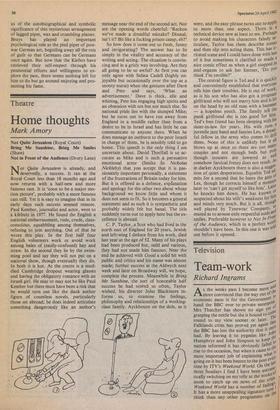Theatre
Home thoughts
Mark Amory
Not Quite Jerusalem (Royal Court)
Bring Me Sunshine, Bring Me Smiles (Shaw) Not in Front of the Audience (Drury Lane)
Not Quite Jerusalem is already, and Not a success. It ran at the Royal Court less than 18 months ago and now returns with a half-new and more famous cast. It is 'soon to be a major mo- tion picture', probably with a more famous cast still. Yet it is easy to imagine that in its early days such success seemed remote. Paul Kember, journalist and actor, went to a kibbutz in 1977. He found the English a national embarrassment, rude, crude, class- conscious, squabbling among themselves, refusing to join anything. Out of that he wrote this play. In the first half four English volunteers work or avoid work among bales of (easily-confused) hay and straw. In the second they lie by the swim- ming pool and say they will not put on a national show, though eventually they do. In both it is hot. At the centre is a mud- dled Cambridge dropout wearing glasses and having the obligatory romance with an Israeli girl. He may or may not be like Paul Kember but there must have been a risk that he would turn out like the dank author figure of countless novels, particularly those set abroad; he does indeed articulate something dangerously like an author's message near the end of the second act. Nor are the opening words cheerful: 'Reckon we've made a dreadful mistake? Dismal, isn't it? Bit like a fucking prison camp, eh?'
So how does it come out so fresh, funny and invigorating? The answer has to lie simply in the vitality and accuracy of the writing and acting. The situation is convin- cing and in a grisly way involving. Are they all going to be so awful? At first you can only agree with Selina Cadell (highly en- joyable but occasionally over the top as a snooty nurse) when she gestures after Dave and Pete and says, 'What an advertisement.' Dave is thick, idle and whining, Pete has engaging high spirits and an obsession with sex but not much else. So national pride lies with the slumped Mike; but he turns out to have run away from England in a muddle rather than from a desire to be in Israel and has little he can communicate to anyone there. When he does manage an outburst to the poor Israeli in charge of them, he is sensibly told to go home. This speech is the only thing I am uncertain about. David Threlfall is so ac- curate as Mike and is such a persuasive emotional actor (Smike in Nicholas Nickleby) that you accept that it is pas- sionately important personally, a statement of the frustrations of Britain today for him. But it is offered as a defence, explanation and apology for the other two about whose background we know little and whom it does not seem to fit. So it becomes a general statement and as such it is sympathetic and probably widely felt but banal. The title suddenly turns out to apply here but the ex- cellence is abroad.
C. P. Taylor, a Scot who had lived in the north east of England for 20 years, Jewish and left-wing I deduce from his work, died last year at the age of 52. Many of his plays had been produced but, mild and various, they had not made him famous. Near the end he achieved with Good a solid hit with public and critics and his name was almost made; further success at the Aldwych next week and later on Broadway will, we hope, complete the process. Meanwhile in Bring Me Sunshine, the sort of honorable half success he had scored so often, Taylor wished, his director John Blackmore in- forms us, to examine the feelings, philosophy and relationships of a working- class family. Ayckbourn on the dole, as it were, and the easy phrase turns out to app1Y to more than one aspect. There is a technical device new at least to me. Perhaps to avoid making his characters falsely at- ticulate, Taylor has them describe scenes and then slip into acting them. This has ir- ritated some and I could have done with less of it but sometimes it clarified or made a nice comic effect as when a girl stopped mid-orgasm to ask her listener, 'Do You think I'm terrible?' The central figure is Ted and it is quicIdY and conveniently established that everyone tells him their troubles. He is out of work, as is his son who has also got a pregnant girlfriend who will not marry him and is hit on the head by an old man with a hammer — a hopeless youth. The family tell the punk girlfriend she is too good for hirri. Ted's best friend has been sleeping with his sister-in-law for years. His wife runs a juvenile jazz band and fancies Les, a dread, ful fellow in the army who comes to do! them. None of this is unlikely but it au blows up at once so there are too marl couples and not enough beds but even though trousers are lowered as we somehow farcical frenzy does not result. As in darker Ayckbourn there is also a sugges; tion of quiet desperation. Equable Ted aa; mits for a second that he hates the guts 0' Les, though he corrects himself a moment later to 'can't get myself to like him'. Later he knocks him down. He has known ar suspected about his wife's weakness for hirj, and minds very much. But it is all, thou8D well played by Tynewear Company, sc)41 muted as to arouse only respectful nods an smiles. Preferable however to Not In Fr°fli o of the Audience, which in a perfect vio, shouldn't have been. In this one it was SOW out before it opened.






































 Previous page
Previous page